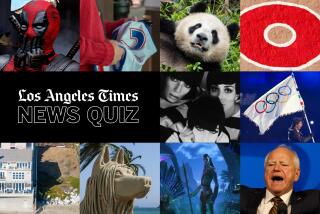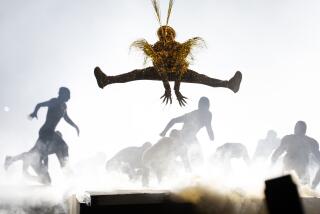Soviets Have It All Under Control--Even Weather
- Share via
MOSCOW — Ominous clouds appeared over the city late Saturday afternoon. Lightning and thunder sent strollers running for cover. Within minutes, the streets were drenched.
It was a performance worthy of a gold medal for Soviet meteorologists, whose advice resulted in helicopters being sent to spray cartridges into the clouds, assuring that the summer storm would pass before the opening ceremony of the Goodwill Games a few hours later.
Thus, the 100,000 people who came to Lenin Central Stadium Saturday night were dampened neither in body nor soul as they watched a grandiose celebration of peace and love, perhaps the largest gathering of that sort since Woodstock.
With a spectacular lavender sunset as a backdrop, Mikhail Gorbachev, General Secretary of the Communist Party, gave a succinct but pointed speech in which he praised the Goodwill Games’ organizers and the Soviet Union for their efforts toward world peace and challenged others, presumably the Reagan Administration, to respond in kind. His speech preempted the final hour of the evening news, a rare occasion here.
“It is manifestations of good will that are needed in relations between people and nations, states and governments, today more than ever before,” said Gorbachev, flanked by Politburo members.
“Good will opens borders, makes it possible to resolve the vital problems of our time. Whatever distances divide us, people of Earth, and whatever the differences between our convictions and life styles, we must come together, talk, argue and vie with one another in honest competition.
“This always helps create an atmosphere of mutual trust and cooperation. Otherwise, Earth cannot be saved from the lurking catastrophe.”
After Gorbachev’s speech, the massive card section, which extended from one 20-yard line to the other, graphically depicted the result of a “Race to the Abyss,” forming a mushroom cloud, the aftermath of a nuclear explosion. The card section then placed a line through it, indicating the international “no” sign.
“From sport comes friendship on Earth,” is the theme of the games, which no one in Moscow could possibly ignore. Many Communist propaganda billboards and banners throughout the city have been replaced by signs that read, “Sport, friendship, peace.”
To keep the peace, security in the city has been doubled. There are policemen and soldiers on every corner, even in lightly traveled areas. Their jobs have been made easier because the city is closed to Soviet citizens who do not have papers to live in Moscow. Fewer people are in Moscow now than at almost any time since the 1980 Olympics, when similar security precautions were taken.
So many uniformed guards lined the women’s marathon route Saturday morning that fans in some areas could not see the runners. One Soviet woman who was waiting for the runners in Gorky Park speculated that more people did not come to see the race because they were intimidated by the militia.
Those who did come saw all 48 runners wearing numbers with the name “Mazda” above them. The banner above the start-finish line also bore the name of the Japanese automobile manufacturer. Surrounding the swimming pool at the Olympic sports complex and the basketball court at the Druzhba Gym are signs with sponsors’ names on them. Marx, Engels and Lenin have been replaced as the big three in this town by Pepsi, Stroh’s and Paper Mate.
That is a strange twist considering that one of the reasons the Soviet Union gave for not attending the 1984 Olympics Games was the Los Angeles Olympic Organizing Committee’s embrace of commercialism.
Marat Gramov, chairman of the Soviet Sports Committee, was asked about commercialism here at a press conference Friday, but he managed to evade the question.
Soviet officials have avoided all controversy, even the decision of the Pentagon not to allow U.S. boxers who are in the military to compete here. Asked why there has been no official Soviet reaction, an official said Saturday that it was because the decision was “inexplicable” and “unexpected.”
Nothing apparently can spoil the festive spirit here as Moscow attempts to show the United States what it missed by boycotting the 1980 Summer Olympics. Igre dobro voli --games of good will--are magic words for foreigners, who have been rushed through customs and into their hotels with relatively little inconvenience.
Two major Soviet newspapers, Pravda and Izvestia, have given the games extensive coverage, even on their front pages. By the latest count, there are more than 3,000 athletes from 70 countries represented, although the two athletic superpowers, the Soviet Union and the United States, have by far the strongest teams.
Since sports and television officials from those two countries, with inspiration from Ted Turner, organized the games, the opening ceremony was built around the positive aspects of their relationship.
Two inflatable, life-sized space capsules were launched, symbolizing the successful 1975 docking between the United States’ Apollo and the Soviet Union’s Soyuz crafts. Repeating their handshake in space 10 years ago, astronaut Thomas Stafford and cosmonaut Alexi Leonov met and embraced on a podium below a box reserved for dignitaries.
Other Americans featured in the ceremony were several of the late Samantha Smith’s former classmates and her mother, Jane Smith. Samantha, the Maine schoolgirl who once visited the Soviet Union upon request of the government after she wrote a letter to former leader Yuri Andropov, was killed in a plane crash last year. In an editorial, Pravda suggested that the CIA was responsible for her death.
Besides thousands of dancers, gymnasts and acrobats, the ceremony also included horses, two bears, a trained seal and even belly dancers.
The Soviet media were critical of the opening ceremony in the Los Angeles Olympics, calling it vulgar because so many scantily clad women were visible. But there was more skin in this show than anywhere east of the Moulin Rouge.
Goodwill Games Notes
Chris O’Neil and John Wichell won their events as U.S. swimmers earned nine more medals, including a third for Angel Myers. The day’s competition gave the U.S. swimmers a total of 25 medals, including six golds, in two days. The Soviets also collected nine medals for a total of 20, seven of them gold. Soviet swimmers swept the first three places in the two races they won--the men’s 200-meter backstroke and the men’s 100 breaststroke. World record-holder Igor Polyansky won the 200 backstroke in 1 minute 58.77 seconds, just over his world mark of 1:58.14, set last year, and Dmitri Volkov took the 100 breaststroke in 1:03.69. The day’s other winners, all in women’s events, were Tanja Bogomilova of Bulgaria in the 100 breaststroke in 1:10.21, Birte Weiganj of East Germany in the 100 butterfly in 1:00.36, Kerstin Kielgas of East Germany in the 200 freestyle in 2:01.91 and Aneta Patrascoiu of Romania in the 200 backstroke in 2:11.69. . . . The U.S. women’s basketball team, led by former USC star Cheryl Miller, defeated Yugoslavia, 72-53. . . . Nadezhda Gumerova led a Soviet sweep of the first five places in the women’s marathon. . . . The Games’ Organizing Committee disallowed a protest by U.S. swimming officials concerning Friday’s men’s 50-meter sprint. John Sauerland of Shaker Heights, Ohio, won the race in 21.13 seconds, but U.S. officials protested, contending that the start was too fast, and said they thought Americans could have finished 1-2-3 instead if 1-6-7. Soviet swimmers finished second and third. However, the protest, filed under the rules of FINA, the governing body of the sport, was disallowed by the Organizing Committee after a jury of merit originally upheld it.
More to Read
Sign up for Essential California
The most important California stories and recommendations in your inbox every morning.
You may occasionally receive promotional content from the Los Angeles Times.












